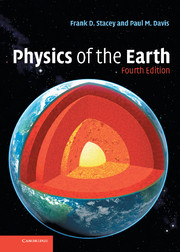Book contents
- Frontmatter
- Contents
- Preface
- 1 Origin and history of the Solar System
- 2 Composition of the Earth
- 3 Radioactivity, isotopes and dating
- 4 Isotopic clues to the age and origin of the Solar System
- 5 Evidence of the Earth's evolutionary history
- 6 Rotation, figure of the Earth and gravity
- 7 Precession, wobble and rotational irregularities
- 8 Tides and the evolution of the lunar orbit
- 9 The satellite geoid, isostasy, post-glacial rebound and mantle viscosity
- 10 Elastic and inelastic properties
- 11 Deformation of the crust: rock mechanics
- 12 Tectonics
- 13 Convective and tectonic stresses
- 14 Kinematics of the earthquake process
- 15 Earthquake dynamics
- 16 Seismic wave propagation
- 17 Seismological determination of Earth structure
- 18 Finite strain and high-pressure equations of state
- 19 Thermal properties
- 20 The surface heat flux
- 21 The global energy budget
- 22 Thermodynamics of convection
- 23 Thermal history
- 24 The geomagnetic field
- 25 Rock magnetism and paleomagnetism
- 26 ‘Alternative’ energy sources and natural climate variations: some geophysical background
- Appendix A General reference data
- Appendix B Orbital dynamics (Kepler's laws)
- Appendix C Spherical harmonic functions
- Appendix D Relationships between elastic moduli of an isotropic solid
- Appendix E Thermodynamic parameters and derivative relationships
- Appendix F An Earth model: mechanical properties
- Appendix G A thermal model of the Earth
- Appendix H Radioactive isotopes
- Appendix I A geologic time scale
- Appendix J Problems
- References
- Name Index
- Subject Index
10 - Elastic and inelastic properties
Published online by Cambridge University Press: 05 July 2013
- Frontmatter
- Contents
- Preface
- 1 Origin and history of the Solar System
- 2 Composition of the Earth
- 3 Radioactivity, isotopes and dating
- 4 Isotopic clues to the age and origin of the Solar System
- 5 Evidence of the Earth's evolutionary history
- 6 Rotation, figure of the Earth and gravity
- 7 Precession, wobble and rotational irregularities
- 8 Tides and the evolution of the lunar orbit
- 9 The satellite geoid, isostasy, post-glacial rebound and mantle viscosity
- 10 Elastic and inelastic properties
- 11 Deformation of the crust: rock mechanics
- 12 Tectonics
- 13 Convective and tectonic stresses
- 14 Kinematics of the earthquake process
- 15 Earthquake dynamics
- 16 Seismic wave propagation
- 17 Seismological determination of Earth structure
- 18 Finite strain and high-pressure equations of state
- 19 Thermal properties
- 20 The surface heat flux
- 21 The global energy budget
- 22 Thermodynamics of convection
- 23 Thermal history
- 24 The geomagnetic field
- 25 Rock magnetism and paleomagnetism
- 26 ‘Alternative’ energy sources and natural climate variations: some geophysical background
- Appendix A General reference data
- Appendix B Orbital dynamics (Kepler's laws)
- Appendix C Spherical harmonic functions
- Appendix D Relationships between elastic moduli of an isotropic solid
- Appendix E Thermodynamic parameters and derivative relationships
- Appendix F An Earth model: mechanical properties
- Appendix G A thermal model of the Earth
- Appendix H Radioactive isotopes
- Appendix I A geologic time scale
- Appendix J Problems
- References
- Name Index
- Subject Index
Summary
Preamble
We refer to a material as elastic if it may be deformed by stress but recovers its original size and shape when released from the stress. In fact no material is perfectly elastic, even if subjected to indefinitely small stresses, but if recovery is almost complete (say >99%) and, subject only to inertial delay, effectively instantaneous, a material is regarded as elastic. Even for such a material we recognize that the slight departure from perfect elasticity has important consequences, which include the attenuation of seismic waves. At high shear stresses departure from ideal elasticity increases sharply. Each material has an approximate elastic limit or yield point, which is the magnitude of stress above which inelastic or permanent deformation starts to become significant. This is additional to the recoverable elastic response and may increase with time at constant stress. There is no sharp cut-off so that very prolonged stresses can cause continued very slow deformation or creep, especially at high temperatures, as in mantle convection.
Small elastic strains are normally proportional to stress (Hooke's law). Then the ratio of stress to strain is an elastic (‘stiffness’) modulus. Stress is force per unit area, measured in pascals (Pa ≡ Nm− 2), and strain is a fractional change in some dimension or dimensions, so that elastic moduli have the same units as stress, i.e. pascals. The theory of elasticity, as we normally consider it, deals only with very small strains, for which elastic moduli are effectively material constants.
Information
- Type
- Chapter
- Information
- Physics of the Earth , pp. 135 - 148Publisher: Cambridge University PressPrint publication year: 2008
